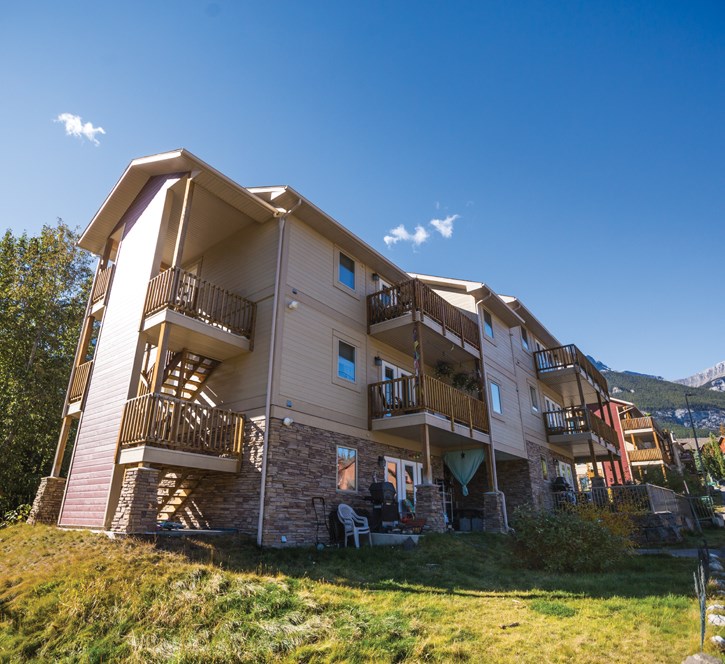CANMORE – On the brink of foreclosure, Canmore’s Mountain Haven Cooperative Housing project is getting help from the community’s housing corporation and elected officials.
With a unanimous motion Tuesday night (Sept. 25), Canmore council voted to spend $4.2 million from its Perpetually Affordable Housing (PAH) reserve to purchase 17 units of rental housing from the cash-strapped housing cooperative.
But, in addition to purchasing the project’s rental units for $3.8 million, the sale agreement includes providing Mountain Haven with a $350,000 interest free loan to establish a replacement reserve. Into the future, 27 ownership equity units will also have to convert into Canmore Community Housing Corporation’s (CCHC) PAH program and a condo corporation be established.
Mayor John Borrowman and fellow councillors expressed their support for the motion and ultimately retaining the entire project as part of the affordable housing portfolio for the community.
“This is an opportunity for us to resolve a number of issues, both for resi dents of the building and residents of Canmore that have, at times, been living in daily fear of losing their home, in a very positive way for the community,” Borrowman said.
While there were concerns that use of the reserve funds would draw down its balance to $400,000, it was clear that should CCHC in the future choose to sell the 17 units as PAH, it would result in a similar contribution back into the reserve.
“I will be happy to support his motion,” said Councillor Joanna McCallum. “I feel this deal is both fair and prudent on behalf of the Town and also for Mountain Haven Cooperative.
“We will acquire 17 units that, once this process is complete, could be sold to qualified PAH applicants.”
McCallum noted there is still a lot of hard work to be done by Mountain Haven in order to complete the purchase agreement, including negotiating with its other creditors and getting approval from its membership.
Mountain Haven board member Warren Jobbitt welcomed the news that council unanimously approved the purchase agreement terms.
“Mountain Haven is extremely excited that we have achieved the original goal at the outset two years ago of retaining
44 affordable housing units in Canmore,” Jobbitt said.
General manager of municipal infrastructure Michael Fark provided council with an overview of the history for the project and its financial struggles.
A grassroots community-driven project that dated back to a time in Canmore when the local government didn’t support affordable housing as part of its mandate, Mountain Haven sits on land owned by Canmore Community Housing Corporation and accessed grant funding through the municipality to complete construction in 2006.
“For all intents and purposes, administration has considered this an affordable housing project supported by the Town of Canmore,” Fark said. “The current situation is that Mountain Haven is facing foreclosure due to a myriad of issues, including grant funding issues that were onerous.”
Provincial grant funding constrained Mountain Haven owners and placed income thresholds on the properties that were prohibitive in seeing the project succeed. The strings attached to the funding made it almost impossible for prospective buyers to purchase units, and for current owners to sell.
Those grant funding conditions have since been removed from the project, after negotiations between Chief Administrative Officer Lisa de Soto and the provincial government were successful.
The Town, CCHC and Mountain Haven have been negotiating toward a solution for 18 months, with multiple offers from the municipality to the cooperative being unsuccessful.
Fark said Mountain Haven was served notice of foreclosure by its creditor, Servus Credit Union, in August and as a result the cooperative made a resolution offer to CCHC to sell the 17 rental units for $4.2 million.
CCHC’s board passed a motion to accept the purchase offer with conditions, which breaks down to the purchase price of $3.9 million, a $350,000 interest free loan to establish a replacement reserve, and a conversion into a condo corporation.
Mountain Haven would be required to ensure its other creditors are satisfied in terms of their debt repayment, and the board is required to get approval from its membership.
Fark noted the purchase price of
$3.8 million is less than what the cooperative owes its creditors ($4.8 million), meaning its members remain in a position of having to pay off additional debt to meet its obligations.
“That is certainly going to be a challenging process for Mountain Haven to go through,” he said.
Earlier this year, council approved $250,000 to fund the conversion into a condo corporation and Fark said that process requires a replacement reserve be in place; hence, the recommendation to establish that with a loan.
The future for all 44 units at Mountain Haven would be under the CCHC program, for both rental and equity units. Owners would be able to sell their units according to the CCHC’s resale formula, which is the build cost ($275/square foot) multiplied by 110 per cent of the Consumer Price Index annually.
Fark said that formula was also used to establish a fair sale price for the 17 units, after all parties involved spent significant time establishing an agreed upon value. He said a key outcome for all involved was to see the housing units remain as affordable housing in the community, instead of being sold at maximum resale value by the bank.
For those currently living in the rental units, CCHC executive director Dougal Forteath said those rental agreements would be honoured and that the board would have to make a decision in the future about which PAH program they continue to operate under into the future.




